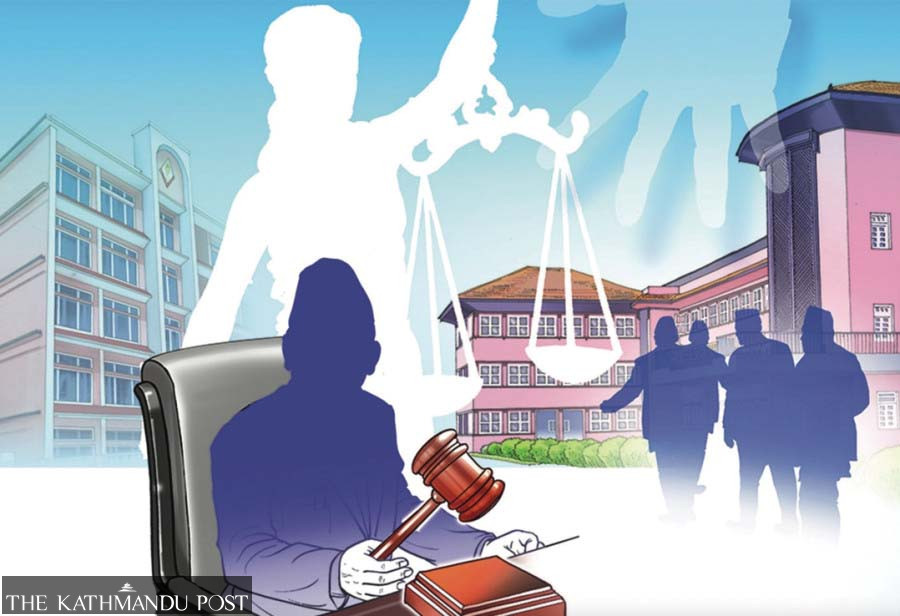National
Judicial Council transfers judges in bulk
Bar Association says appointments flout the essence and spirit of the proportional and inclusive state. It argues that the position of judge is a custodian of public trust and must be granted based on merit and competence.
Post Report
The Judicial Council has made a large-scale reshuffle in the judiciary, transferring 120 judges from special, high and district courts.
A council meeting led by Chief Justice Prakash Man Singh Raut on Friday recommended appointing four Special Court members including its chairperson while it has transferred five out of six of its members to various high courts. As per the Judicial Council Act, the chairperson and members of the Special Court are appointed by the government as recommended by the council.
In a statement after the meeting, the council said it has recommended Sudarshan Dev Bhatt, a judge of the High Court Patan, as the chairperson of the Special Court. He will replace Tek Narayan Kunwar, who has been transferred to Janakpur High Court.
As per the council’s decision, judges Narayan Prasad Paudel from the Birgunj High Court, Hemanta Rawal from the Surkhet High Court, Dilli Ratna Shrestha from the Jumla Bench of High Court, and Judge Umesh Koirala will be appointed special court members.
Current members—Tej Narayan Singh Rai, Ram Bahadur Thapa, Muraribabu Shrestha, and Ritendra Thapa—of the court with the charge to hear the corruption cases will be working at various high courts in the provinces.
They, according to the council, were transferred in line with the practice of transferring judges after serving two years at the same location. Only Bidur Koirala, who was transferred to the court a year later, remains unchanged as its member.
Through the transfers, the council has also adjusted the judges appointed last week. On August 7, the council recommended 27 judges for the high courts. Among them 16 were promoted from district courts, five were picked from the judicial service while six were the lawyers. They have already assumed their offices.
Their appointment was criticised by the legal fraternity. Issuing a statement on August 8, Nepal Bar Association expressed serious concern over the council’s decision and said it doesn’t welcome the appointments.
The statement said that it objects to the appointments done without correcting the revision to the judicial council regulation which envisions making the Supreme Court chief registrar the high court chief judge. The umbrella body of lawyers has been at loggerheads with the council’s leadership over the decision.
"The revised and discriminatory rules of the council must be immediately repealed. Transparent, objective, and predictable criteria must be established for judicial appointments, and the principle of proportional inclusive representation, as envisioned by the constitution, must be fully implemented," read the council’s statement issued on August 8.
"Until these demands are fulfilled and the revised rules revoked, the Nepal Bar Association will not welcome any appointments made by the Judicial Council."
The Bar emphasised that it is not only an integral part and stakeholder of the justice system but also a key partner of the Judicial Council. The statement further said, "The Council has completely disregarded the concerns of the Bar while making such an important and far-reaching decision. This is contrary to the principles of cooperation and transparency, and such practices promote arbitrariness."
The Bar noted that the position of judge is a custodian of public trust and must be granted based on merit and competence. "Despite commitments to numerous reforms, the judicial reform reports have become merely decorative documents, and responsible bodies appear indifferent towards their implementation," the statement added.
It further claimed that this appointment completely ignored the essence and spirit of the proportional and inclusive state envisioned by Nepal's constitution.
This appointment has rebuffed the need for meaningful representation of women, different geographic regions, classes, and communities in the vital state organ, the statement said. "Such an imbalanced appointment seriously harms the spirit of equal access and ownership of the judiciary and has weakened public trust in the justice system."




 9.12°C Kathmandu
9.12°C Kathmandu














